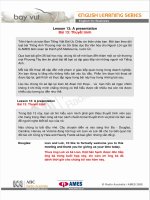acturial presentation
Bạn đang xem bản rút gọn của tài liệu. Xem và tải ngay bản đầy đủ của tài liệu tại đây (600.19 KB, 21 trang )
BRIDGING THE GAP BETWEEN
THEORY AND PRACTICE IN
INSURANCE AND ACTUARIAL
FIELDS
Batsirai Winmore Mazviona - Director
Centre for Risk Management and Insurance
149 Crystal Hope Close, Goodhope, Harare, Zimbabwe
Cell: +263 772 529 852
Email:
Presentation Outline
1
Insurance World
2
Actuarial World
3
Actuaries in an Insurance World
4
Conclusion
Insurance World
Basics of Insurance
Insurance
Functional definition
Contractual definition
Insurance is a co-operative
device to spread the loss
caused by a particular risk over
a number of persons who are
exposed to it and who agree to
insure themselves against the
risk.
Insurance is a contract in
which a sum of money is paid
to
the
assured
as
consideration of insurer’s
incurring the risk of paying a
large sum upon a given
contingency.
Basic Functions of Insurance
1.
Primary Functions
2.
Secondary Functions
3. Other Functions
Primary Functions of Insurance
Providing protection – The elementary purpose of insurance
is to allow security against future risk, accidents and
uncertainty. Insurance cannot arrest the risk from taking
place, but can for sure allow for the losses arising with the
risk. Insurance is in reality a protective cover against
economic loss, by apportioning the risk with others.
Collective risk bearing – Insurance is an instrument to share
the financial loss. It is a medium through which few losses
are divided among larger number of people. All the insured
add the premiums towards a fund and out of which the
persons facing a specific risk is paid.
Evaluating risk – Insurance fixes the likely volume of risk by
assessing diverse factors that give rise to risk. Risk is the
basis for ascertaining the premium rate as well.
Provide Certainty – Insurance is a device, which assists in
changing uncertainty to certainty.
Secondary Functions of Insurance
Preventing losses – Insurance warns individuals and
businessmen to embrace appropriate device to prevent
unfortunate aftermaths of risk by observing safety
instructions; e.g installation of alarm systems in a building.
Covering larger risks with small capital – Insurance assuages
the businessmen from security investments. This is done by
paying small amount of premium against larger risks and
dubiety.
Helps in the development of larger industries – Insurance
provides an opportunity to develop to those larger industries
which have more risks in their setting up.
Other Functions of Insurance
Is a savings and investment tool – Insurance is the best
savings and investment option, restricting unnecessary
expenses by the insured. Also to take the benefit of income
tax exemptions, people take up insurance as a good
investment option.
Medium of earning foreign exchange – Being an international
business, any country can earn foreign exchange by way of
issue of marine insurance policies and a different other ways.
Risk Free trade – Insurance boosts exports insurance, making
foreign trade risk free with the help of different types of
policies under marine insurance cover.
Insurance provides indemnity, or reimbursement, in the
event of an unanticipated loss or disaster. There are
different types of insurance policies which cover almost
anything
that
one
might
think
of.
Insurance Classification
Actuarial World
Who is an Actuary?
• What ‘they’ think an Actuary is:
An Actuary
• Actuaries are experts who perform actuarial analysis of
insurance rates, rating procedures, rating plans, and
schedules
of
insurance
companies.
These
are
professionals who are experienced in reviewing and
analysing
insurance
operations,
reserves
and
underwriting procedures and provide technical assistance
regarding actuarial matters to policy examiners and other
technical staff.
• Traditionally an actuary worked in the areas of life
assurance or pensions.
• However, actuaries are now using their risk management
skills in other areas.
Their Main Activities
• Analysing insurance rates, such as for cars, homes or life
insurance.
• Estimating the money to be set-aside for claims that have
not yet been paid.
• Participating in corporate planning, such as mergers and
acquisitions.
• Calculating a fair price for a new insurance product.
• Product design.
• Forecasting the potential impact of catastrophes.
• Analysing investment programs.
Where do Actuaries Work?
•
•
•
•
•
•
•
•
Life insurance
Pension funds
General insurance
Health insurance
Investments
Government
Academics
Consultants firms
Role of Actuaries
• Evaluating the likelihood of future events.
• Designing creative ways to reduce the likelihood of
undesirable events.
• Decreasing the impact of undesirable events that do
occur.
• Gathering analytical skills, business knowledge and
understanding. of human behaviour to design and manage
programs that control risk.
Actuaries in an Insurance World
Actuarial Functions in Insurance
Underwriting and Pricing
Claims and Insurance Operations
Reinsurance
Reserving
Actuarial Functions in Insurance
Risk and Capital Management
Financial Reporting
Customer Loyalty Strategy
Litigation Support
CRMI Insurance Projects in progress
• Insurance rating framework for Zimbabwe insurance
industry.
• ICT governance framework for Zimbabwe insurance
industry.
• Corporate governance in the insurance industry.
• Telematics and usage-based insurance in Zimbabwe.
• Application of index-based insurance in Zimbabwe.
• Customer Satisfaction Index for insurance.
• Solvency II for Zimbabwe.
• Microinsurance
Conclusion
• With all that has been highlighted in this presentation, it
is clear that actuarial skills
are critical in solving a
plethora of challenges in the insurance field.
• Some of the key drivers in achieving a vibrant insurance
industry include:
• Establishment of a database of various business lines e.g
we could start with the Motor Insurance Database such
database will assist for instance in product design and
pricing (CRMI is ready to partner with the industry in this
initiative).
• Commitment of the industry to support research and
innovation in insurance e.g availing data to researchers,
research funds.
• A practically oriented insurance curriculum which
addresses practical challenges.
• Seminars, conferences and forums to exchange ideas.
Thank you for listening!
Questions and Comments?









